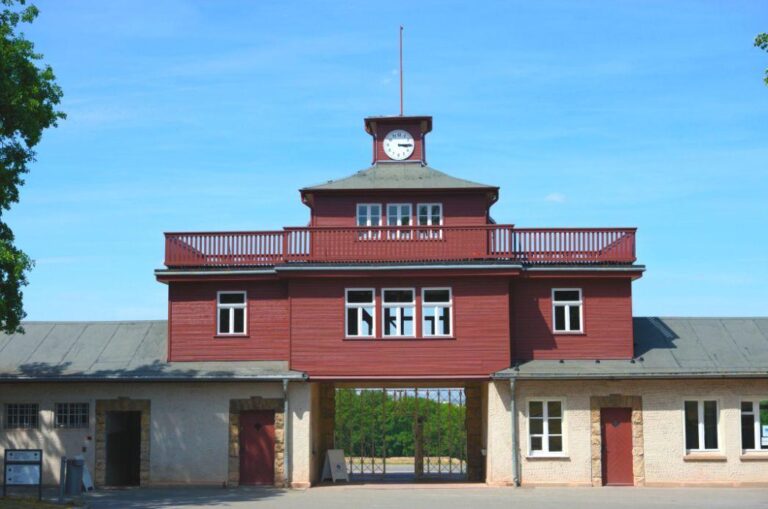A German court has upheld the decision allowing the Buchenwald Memorial to refuse entry to visitors wearing the Palestinian keffiyeh, citing concerns over the symbol’s political connotations. The ruling, reported by The Guardian, highlights ongoing tensions surrounding the display of political symbols at sites of historical remembrance, particularly those linked to the atrocities of the Nazi era. The case raises complex questions about freedom of expression, memory culture, and the boundaries of acceptable conduct at Holocaust memorials.
Buchenwald Authorities Uphold Right to Deny Entry Over Palestinian Keffiyeh Attire
The German judiciary has affirmed the right of Buchenwald Memorial authorities to refuse entry to visitors who wear the Palestinian keffiyeh, citing concerns over political statements at a site dedicated to the remembrance of Nazi atrocities. The court ruled that the symbolic nature of the keffiyeh could be perceived as provocative or as an expression of political tension, potentially undermining the memorial’s purpose as a neutral space for reflection and education.
Officials emphasized that maintaining an environment free from political demonstrations is crucial for preserving the solemnity of the site. The court highlighted key considerations:
- Preventing the display of symbols that may incite conflict or alienate visitors
- Upholding the memorial’s role as a place focused on historical remembrance without current political controversies
- Balancing freedom of expression with the need for respectful commemoration
| Aspect | Memorial’s Position | Court’s View |
|---|---|---|
| Symbol Display | Restricted | Supported |
| Visitor Experience | Neutral Space | Protective |
| Freedom of Expression | Limited | Balanced |
German Court Emphasizes Historical Sensitivities and Memorial Integrity in Decision
In a landmark ruling, a German court upheld the authority of Buchenwald Memorial officials to deny entry to visitors wearing the Palestinian keffiyeh, underscoring the importance of maintaining the sanctity and historical context of the site. The court highlighted that certain symbols, including the keffiyeh in this context, may be perceived as provocative or as having political connotations that could disrupt the memorial’s primary focus: commemorating the victims of Nazi persecution.
Emphasizing the delicate balance between freedom of expression and respect for historical remembrance, the court outlined several key considerations:
- Preservation of Memorial Integrity: Ensuring that the site remains a place of solemn reflection without any form of political agitation.
- Historical Sensitivities: Acknowledging the painful legacy the site represents, requiring sensitivity from all visitors.
- Visitor Experience: Protecting those who come to honor victims from potential discomfort or disturbance.
| Aspect | Explanation |
|---|---|
| Symbol Restrictions | Selective ban based on historical context |
| Freedom of Expression | Limited within memorial grounds to prevent offense |
| Memorial Purpose | Focus on remembrance and education |
Experts Urge Clear Guidelines to Balance Free Expression with Respect for Holocaust Sites
In a landmark decision, the German court has upheld Buchenwald concentration camp’s right to deny entry to visitors displaying the Palestinian keffiyeh, emphasizing the need to protect the sanctity of Holocaust memorial sites. Experts highlight that this ruling underscores the complex challenge of safeguarding spaces dedicated to remembrance from political expression that could be perceived as provocative or disrespectful. They advocate for well-defined policies that recognize both the importance of free speech and the solemn nature of such historical grounds.
Legal scholars and human rights organizations are calling for clear, consistent guidelines that strike a balance without infringing on democratic freedoms. Key points under discussion include:
- Defining symbols and actions that may disrupt the commemorative purpose
- Establishing transparent criteria for admissible conduct within memorial sites
- Ensuring enforcement practices respect individual rights yet prioritize dignity of the victims
| Aspect | Considerations |
|---|---|
| Free Expression | Protected by law but not absolute in sensitive locations |
| Memorial Integrity | Requires preservation of solemnity and respect |
| Political Symbols | Context-dependent interpretation and potential restrictions |
In Summary
The ruling by the German court underscores the ongoing tensions surrounding symbols associated with political conflicts and the boundaries of public expression in memorial spaces. As debates continue over the appropriate ways to honor history while addressing present-day sensitivities, the decision sets a precedent for how institutions like Buchenwald Memorial navigate the complex interplay of remembrance, free speech, and political symbolism. Observers will be watching closely to see how this judgment influences future policies at historical sites across Germany and beyond.




